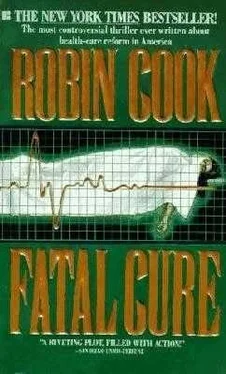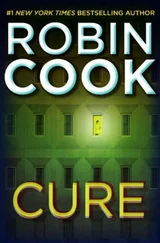David slipped in alongside Caroline, opposite Dr. Pilsner. She looked up at David with pleading eyes. Covering the lower part of her face was a clear plastic mask providing oxygen. Her complexion was ashen with a slightly bluish cast. Her breathing was labored.
Dr. Pilsner was listening to her chest. He smiled at David when he saw him. When he finished auscultating, he took David aside.
"Poor thing is having a hard time," Dr. Pilsner said.
"What's wrong?" David asked.
"The usual," Dr. Pilsner replied. "She's congested and she's running a high fever."
"Will you admit her?" David asked.
"Absolutely," Dr. Pilsner said. "You know better than most that we can't take any chances with this kind of problem."
David nodded. He did know. He looked back at Caroline struggling to breathe. She looked so tiny on the big gurney and so vulnerable. The sight made him worry about Nikki. Given her cystic fibrosis, it could have been Nikki on the gurney, not Caroline.
"You've got a call from the chief medical examiner," one of the secretaries told Angela. Angela picked up the phone.
"Hope I'm not disturbing you," Walt said.
"Not at all," Angela answered.
"Got a couple of updates on the Hodges autopsy," Walt said. "Are you still interested?"
"Absolutely," Angela said.
"First of all, the man had significant alcohol in his ocular fluid," Walt said.
"I didn't know you could tell after so long," Angela said.
"If we can get ocular fluid it's easy," Walt said. "Alcohol is reasonably stable. We also got confirmation that the DNA of the skin under his nails was different from his. So it's undoubtedly the DNA of his killer."
"What about those carbon particles in the skin?" Angela asked. "Did you have any more thoughts about them?"
"To be honest, I haven't given it a lot of thought," Walt said. "But I did change my mind about it being contemporary with the struggle. I realized the particles were in the dermis, not the epidermis. It must have been some old injury, like having been stabbed with a pencil when he was in grammar school. I have such a deposit on my arm."
"I've got one in the palm of my right hand," Angela said.
"The reason I haven't done much on the case is because there's been no pressure from either the state's attorney or the state police. Unfortunately, I've been swamped with other cases where there's considerable pressure."
"I understand," Angela said. "But I'm still interested. So if there are any more developments, please let me know."
After hanging up Angela's thoughts remained on the Hodges affair, wondering what Phil Calhoun was doing. She'd heard nothing from him since she'd visited the man and had given him his retainer. And thinking about Hodges and Calhoun made her remember how vulnerable she'd felt when David had left in the night to go to the hospital.
Checking her watch, Angela realized it was time for her lunch break. She turned off her microscope, grabbed her coat, and went out to the car. She'd told David that she wanted to get a gun, and she'd meant it.
There were no sporting goods stores in Bartlet, but Staley's Hardware Store carried a line of firearms. When she explained what she wanted, Mr. Staley was instantly helpful. He asked her what her reasons were for wanting to purchase a gun. When she told him protection of her home, he talked her into a shotgun.
It took Angela less than fifteen minutes to make her selection. She bought a pump-action twelve-gauge shotgun. Mr. Staley was more than happy to show her how to load and unload the rifle. He was particularly careful to show her the safety. The firearm also came with a brochure, and Mr. Staley encouraged her to read it.
On the walk back to the car, Angela felt self-conscious about her package even though she'd insisted that Mr. Staley wrap it in manila paper; the object within was still quite recognizable. She'd never carried a gun before. In her other hand she had a bag containing a box of shells.
With definite relief Angela put the rifle in the trunk of the car. Heading around to the driver's side door she looked across the green at the police station and hesitated. Ever since the confrontation with Robertson the previous morning she'd felt guilty. She also knew David had been right; it was foolhardy for her to make an enemy of the chief of police despite the fact that he was such a dolt.
Letting go of the car door, Angela walked across the green and into the police station. Robertson agreed to see her after a ten-minute wait.
"I hope I'm not bothering you," Angela said.
"No bother," he said as she entered his office.
Angela sat down. "I don't want to take much of your time," Angela said.
"I'm a public servant," Robertson said brazenly.
"I've come to apologize for yesterday," Angela said.
"Oh?" Robertson said, clearly taken aback.
"My behavior was inappropriate," Angela said. "And I'm sorry. It's just that I've really been overwhelmed by the discovery of that dead body in my house."
"Well, it's nice of you to come in," Robertson said, clearly flustered. He hadn't expected this. "I'm sorry about Hodges. We'll keep the case open and let you know if anything turns up."
"Something did turn up this morning," Angela said. She then told Robertson about the possibility of Hodges' killer having a deposit of carbon from a pencil on his arm.
"From a pencil?" Robertson asked.
"Yes," Angela said. She stood up and extended her right palm and pointed to a small, dark stain beneath the skin. "Something like this," she said. "I got it in the third grade."
"Oh, I see," Robertson said, nodding his head as a wry smile turned up the corners of his mouth. "Well, thank you for this tip."
"Just thought I'd pass it along," Angela said. "The medical examiner also said that the skin under Hodges' fingernails was definitely his killer's. He has a DNA fingerprint."
"Trouble is, super-sophisticated DNA malarkey is not much help without a suspect," Robertson said.
"There was a small town in England that solved a rape with a DNA fingerprint," Angela said. "All they did was do a DNA test on everybody in the town."
"Wow," Robertson said. "I can just imagine what the American Civil Liberties Union would say if I tried that here in Bartlet."
"I'm not suggesting you try," Angela said. "But I did want you to know about the DNA fingerprint."
"Thank you," Robertson said. "And thanks for coming by." He stood up when Angela got up to go.
He watched through his window as Angela got in her car.
As she drove off, Robertson picked up his phone and pressed one of the automatic dialers. "You're not going to believe this, but she's still at it. She's like a dog with a bone."
Angela felt a little better for having tried to clear things up with Robertson. At the same time she didn't delude herself into thinking that she'd changed anything. Intuitively she knew he still wasn't about to lift a finger to get Hodges' murder case solved.
At the hospital, all the parking slots reserved for the professional staff near the back entrance of the hospital were occupied. Angela had to zig-zag back and forth through the lot looking for a vacant spot. Finding nothing, she drove into the upper lot. She finally located a spot way up in the far corner. It took her almost five minutes to walk back to the hospital door.
"This isn't my day," Angela said aloud as she entered the building.
"But you won't even be able to see the parking garage from the town," Traynor said into the phone. His frustration was thinly masked. He was talking to Ned Banks, who had become one of the town's Selectmen the previous year.
"No, no, no," Traynor reiterated. "It's not going to look like a World War II bunker. Why don't you meet me sometime at the hospital and I'll show you the model. I promise you, it's rather attractive. And if Bartlet Community Hospital intends to be the referral hospital of the state, we need it."
Читать дальше












